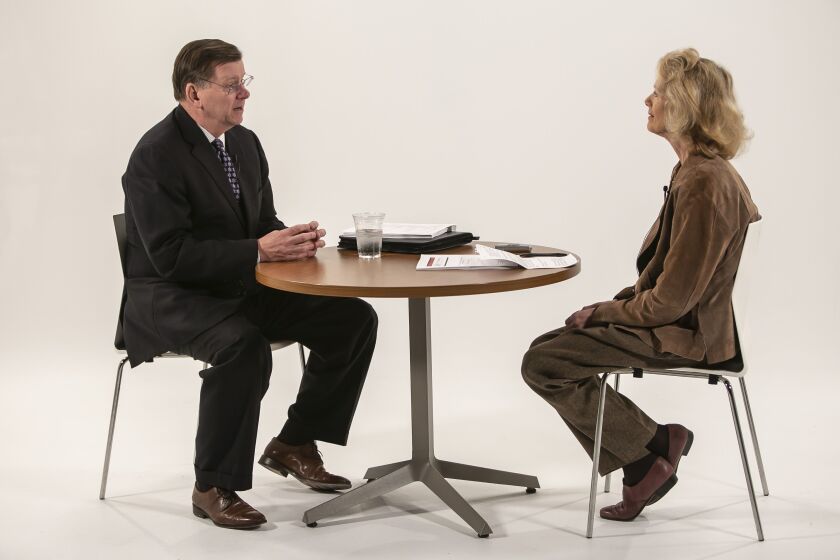Chicago’s next mayor should think big about cost-cutting to confront a $1 billion spike in pension payments because “low-hanging fruit” on the revenue side has already been plucked, the Civic Federation president said Friday.
Laurence Msall argued that the time to tinker at the margins of reducing government bureaucracy is over. It’s time to get out the meat ax.
Reconcile the number of firehouses with a decline in fire calls and a spike in medical emergencies.
Merge the Department of Water Management and the Metropolitan Water Reclamation District.
Make the Chicago Public Schools and Chicago Park District separate city departments.
Fold the RTA, CTA, Metra, Chicago Department of Transportation and the Illinois Toll Highway Authority into one mega-transit agency.
Cut the City Council in half, reduce the number of committees and eliminate the $66 million-a-year aldermanic menu program in favor of a detailed capital plan with clearly-stated priorities.
Switch the $9.50-a-month garbage collection fee to a volume-based fee that incentivizes recycling to boost Chicago’s dismal 9 percent recycling rate.
None of those solutions will come easy. All will encounter fierce political resistance.
But Msall argued that there is simply no other way to confront Chicago’s daunting financial challenges.
“We have enormous debt. We have $30 billion in unfunded pension promises. We have the challenge of the consent decree for police that’s gonna cost a lot of money. We can’t afford to be inefficient in Chicago … We have to … say what is the most efficient way to deliver services? Not based on what we’ve done in the past or what has made political sense,” Msall said.
“On the revenue side, most of the … low-hanging fruit has been both picked and eaten by previous administrations … There is no obvious tax that previous mayors have not exploited … They are very close to basically pushing people away from Chicago.”
In arguing for the water merger, Msall pointed to the $2 billion cost of replacing lead service lines carrying water from the mains to an estimated 360,000 Chicago homes.
“The Water Reclamation District [is]…a stronger level of government financially. So they would have more ability to do things like address the lead pipe crisis that we have in Chicago. That’s going to be a tremendous cost. That has basically been an example where the city didn’t benefit from having its own water department. We allowed things to continue long after we recognized the danger of lead pipes,” Msall said.
“Why do we focus on just one end of the pipe for each government — the intake and the outtake? The expertise needed to administer that city and region-wide is similar.”
Creating one transportation super-agency may sound crazy.
But Msall argued that it could literally save tens of millions of dollars in administrative and borrowing costs, and create opportunities to dramatically improve service delivery.
“Chicago and all of these governments are in bad financial shape. That can be an opportunity if you want to modernize. If you want to consolidate. If you want to address your problems. And if you want to comprehensively plan so we don’t make decisions in the abstract,” Msall said.
“We have a real congestion problem in the downtown area as well as in the suburbs … We need a comprehensive plan that can be both identified and implemented … You could take a truly regional approach and empower the super-agency to make the tough decisions.”
In 2012, then-Fire Commissioner Robert Hoff abruptly announced his retirement after declaring that he was “deathly against” closing fire houses or reducing the minimum staffing requirement on fire apparatus – the issue that triggered the bitter 1980 firefighters strike.
At the time, Mayor Rahm Emanuel had taken aim at treasured union perks that included the clothing allowance; holiday and duty-availability pay; pay grades; premium pay; non-duty lay-up coverage; a physical fitness incentive; and a 7-percent premium paid to cross-trained firefighter-paramedics.
The mayor subsequently backed away from all of those concession demands in a pre-election contract that won him the surprise endorsement of the Chicago Firefighters Union Local 2.
Msall risks re-igniting that political firestorm. But he said it’s “hard to see why Chicago needs the same amount of firehouses” when fire prevention, sprinkler mandates and cooperative agreements with surrounding suburbs have reduced the number of fires.
“We need some of these firehouses only on occasion. Because we have over-capacity in the firehouses and firemen, we send fire trucks out to medical emergencies,” he said.
“Is that the best way to send your most expensive trucks, your largest vehicles racing through the city to find out if somebody needs an ambulance because we don’t have enough ambulances?”





